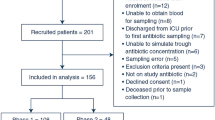Abstract
As data on procalcitonin utility in antibiotics discontinuation [under an antimicrobial stewardship program (ASP)] in patients with malignancies are lacking, we aimed to evaluate the utility of procalcitonin in an ASP in patients with malignancies. We conducted a retrospective review of the ASP database of all patients with malignancies in whom at least one procalcitonin level was taken and our ASP had recommended changes in carbapenem regimen, from January to December 2011. We compared clinical outcomes between two groups of patients: patients whose physicians accepted and those whose physicians rejected ASP interventions. There were 749 carbapenem cases reviewed. Ninety-nine were suggested to either de-escalate, discontinue antibiotics, or narrow the spectrum of empiric treatment, based on procalcitonin trends. While there was no statistical difference in the mortality within 30 days post-ASP intervention (accepted: 8/65 patients vs. rejected: 9/34 patients; p = 0.076), the median duration of carbapenem therapy was significantly shorter (5 vs. 7 days; p = 0.002). Procalcitonin use safely facilitates decisions on antibiotics discontinuation and de-escalation in patients with malignancies in the ASP.
Similar content being viewed by others
References
Lipsitch M, Bergstrom CT, Levin BR (2000) The epidemiology of antibiotic resistance in hospitals: paradoxes and prescriptions. Proc Natl Acad Sci USA 97(4):1938–1943
Gould CV, Rothenberg R, Steinberg JP (2006) Antibiotic resistance in long-term acute care hospitals: the perfect storm. Infect Control Hosp Epidemiol 27(9):920–925
McGowan JE Jr (1983) Antimicrobial resistance in hospital organisms and its relation to antibiotic use. Rev Infect Dis 5(6):1033–1048
Hsu L-Y, Tan T-Y, Tam VH, Kwa A, Fisher DA, Koh T-H; Network for Antimicrobial Resistance Surveillance (Singapore) (2010) Surveillance and correlation of antibiotic prescription and resistance of Gram-negative bacteria in Singaporean hospitals. Antimicrob Agents Chemother 54(3):1173–1178
Liew YX, Chlebicki MP, Lee W, Hsu LY, Kwa AL (2011) Use of procalcitonin (PCT) to guide discontinuation of antibiotic use in an unspecified sepsis is an antimicrobial stewardship program (ASP). Eur J Clin Microbiol Infect Dis 30(7):853–855
McGregor JC, Kim PW, Perencevich EN, Bradham DD, Furuno JP, Kaye KS, Fink JC, Langenberg P, Roghmann M-C, Harris AD (2005) Utility of the Chronic Disease Score and Charlson Comorbidity Index as comorbidity measures for use in epidemiologic studies of antibiotic-resistant organisms. Am J Epidemiol 161(5):483–493
Rhee J-Y, Kwon KT, Ki HK, Shin SY, Jung DS, Chung D-R, Ha B-C, Peck KR, Song J-H (2009) Scoring systems for prediction of mortality in patients with intensive care unit-acquired sepsis: a comparison of the Pitt bacteremia score and the Acute Physiology and Chronic Health Evaluation II scoring systems. Shock 31(2):146–150
Seto WH, Ching TY, Kou M, Chiang SC, Lauder IJ, Kumana CR (1996) Hospital antibiotic prescribing successfully modified by ‘immediate concurrent feedback’. Br J Clin Pharmacol 41(3):229–234
Liew YX, Lee W, Kwa AL, Lye DC, Yeo CL, Hsu LY (2011) Inappropriate carbapenem use in Singapore public hospitals: opportunities for antimicrobial stewardship. Int J Antimicrob Agents 37(1):87–88
Sandri MT, Passerini R, Leon ME, Peccatori FA, Zorzino L, Salvatici M, Riggio D, Cassatella C, Cinieri S, Martinelli G (2008) Procalcitonin as a useful marker of infection in hemato-oncological patients with fever. Anticancer Res 28(5B):3061–3065
Schüttrumpf S, Binder L, Hagemann T, Berkovic D, Trümper L, Binder C (2003) Procalcitonin: a useful discriminator between febrile conditions of different origin in hemato-oncological patients? Ann Hematol 82(2):98–103
Financial support
This study received no financial support of any type.
Conflict of interest
Kwa AL-H has received fundings for research from Janssen-Cilag, Pfizer, and Merck Sharp & Dohme (I.A.) Corp. The rest of the authors do not have any potential conflict of interest to declare.
Author information
Authors and Affiliations
Corresponding author
Rights and permissions
About this article
Cite this article
Liew, Y.X., Lee, W., Cai, Y.Y. et al. Utility and safety of procalcitonin in an antimicrobial stewardship program (ASP) in patients with malignancies. Eur J Clin Microbiol Infect Dis 31, 3041–3046 (2012). https://doi.org/10.1007/s10096-012-1662-2
Received:
Accepted:
Published:
Issue Date:
DOI: https://doi.org/10.1007/s10096-012-1662-2




